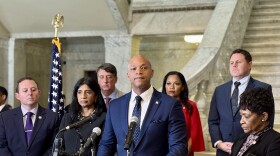There’s still a lot of uncertainty about what federal spending cuts may be coming, but state lawmakers are only in Annapolis for their annual legislative session for two more weeks. Some Maryland lawmakers are making contingency plans for what might happen if the federal government makes massive cuts to state spending.
The Senate version of the budget may include actions that get “triggered” if the federal government makes certain cuts, said Senate President Bill Ferguson.
“These triggers are really important financial balancing tools to be realistic about the dangers ahead and put us in a place to be able to prioritize what we're able to restore in a cut environment,” he told reporters Friday.
For example, if the federal government shifts 50% of Medicaid costs to Maryland, that would be about $1 billion in additional expenses the state would need to bear.
“We don’t have those resources right now, and so we would not be able to provide those services,” Ferguson said. “What the trigger would do is allow for 90 to 120 days to give us a chance to figure out what we can reallocate to try and protect that to the degree that we can.”
The House version of the budget, which the chamber is due to take up Monday evening, does not have this type of provision related to healthcare costs, said House Appropriations Committee Chair Ben Barnes.
State law already includes a few provisions that pause specific funding programs in certain circumstances.
The Blueprint for Maryland’s Future, the sweeping state education reform plan, has one such provision. Under existing law, if state revenue projections decline more than 7.5% between March and December, the amount of money schools get freezes at the most recent level.
Legislation lawmakers are currently considering changes that threshold to 3.75%. So if state revenues decline more than 3.75% between March and December, school funding stays flat the following fiscal year. The legislation also freezes school funding if the total amount of federal funds the state receives drops by at least 3.75%.
Though Ferguson suggested lawmakers are looking at similar provisions related to healthcare and disaster relief spending, Senate Budget and Taxation Committee Chair Guy Guzzone said they are still working out the details.








